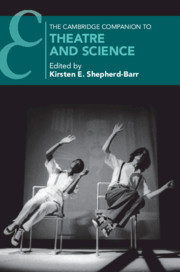Book contents
- The Cambridge Companion to Theatre and Science
- Cambridge Companions to Theatre and Performance
- The Cambridge Companion to Theatre and Science
- Copyright page
- Contents
- Illustrations
- Contributors
- Acknowledgements
- Introduction
- 1 Objectivity and Observation
- 2 Staging Consciousness
- 3 The Experimental/Experiential Stage
- 4 A Cave, a Skull, and a Little Piece of Grit
- 5 The Play at the End of the World
- 6 Bodies of Knowledge
- 7 Pathogenic Performativity
- 8 Theatres of Mental Health
- 9 Devised Theatre and the Performance of Science
- 10 Theatre and Science as Social Intervention
- 11 Acting and Science
- 12 Staging Cognition
- 13 Clouds and Meteors
- 14 ‘The Stage Hand’s Lament’
- Index
- References
11 - Acting and Science
Published online by Cambridge University Press: 20 January 2021
- The Cambridge Companion to Theatre and Science
- Cambridge Companions to Theatre and Performance
- The Cambridge Companion to Theatre and Science
- Copyright page
- Contents
- Illustrations
- Contributors
- Acknowledgements
- Introduction
- 1 Objectivity and Observation
- 2 Staging Consciousness
- 3 The Experimental/Experiential Stage
- 4 A Cave, a Skull, and a Little Piece of Grit
- 5 The Play at the End of the World
- 6 Bodies of Knowledge
- 7 Pathogenic Performativity
- 8 Theatres of Mental Health
- 9 Devised Theatre and the Performance of Science
- 10 Theatre and Science as Social Intervention
- 11 Acting and Science
- 12 Staging Cognition
- 13 Clouds and Meteors
- 14 ‘The Stage Hand’s Lament’
- Index
- References
Summary
Chapter 11: This chapter surveys intersections between views of acting and paradigms of science, and addresses views of the human. The chapter begins with a brief historical overview, starting with Plato and Aristotle and proceeding to early twentieth-century scientists such as Pavlov and Freud. The focus is on late twentieth- and early twenty-first-century cognitive sciences and neuroscience, which provide the actor with concrete, material information about how body and brain work. This helps to eliminate misapprehensions about how different aspects of the self operate and offers insight into imagination, intellect, emotion, memory, and language, among other aspects of our experience. The discussion addresses the fact of actors as complex processes, inextricably connected to each other and their environments, and how the actor might utilize the findings of science.
Keywords
- Type
- Chapter
- Information
- The Cambridge Companion to Theatre and Science , pp. 162 - 175Publisher: Cambridge University PressPrint publication year: 2020

